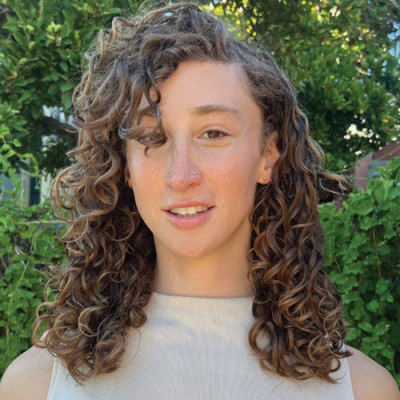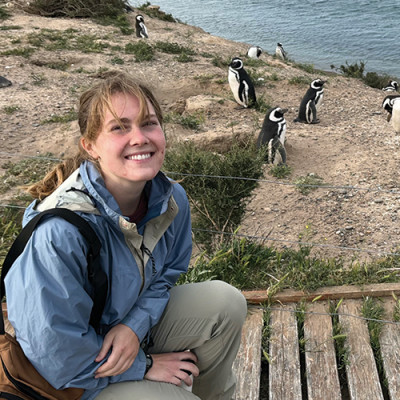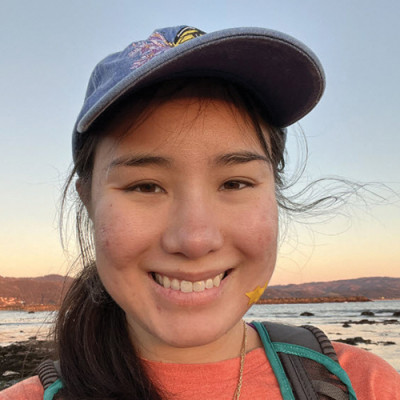Three doctoral students from California universities have been selected for the 2024 NOAA National Marine Fisheries Service (NMFS)-Sea Grant Fellowship. Lizzy Ashley and Emma Gee have been awarded the program’s Population and Ecosystem Dynamics Fellowship, which supports research on ways to assess the status of marine ecosystems, fisheries and protected species. Gal Koss has been awarded the program’s Marine Resource Economics Fellowship, which focuses on addressing the economic dimensions of conserving and managing living marine resources.
Fellows are chosen through a competitive process that involves a national review by an expert panel. Fellows receive support for up to three years and are guided by at least two mentors — one from the fellow’s university and one from NOAA Fisheries — as they work on thesis problems of public interest, and participate in an annual symposium.
Since the fellowship launched in 1990, Sea Grant and NMFS have supported over 160 PhD students. Program alumni have gone on to hold key roles within NOAA Fisheries, other agencies, academic institutions and fishery management councils and have made substantial contributions to the management and conservation of marine ecosystems.
Read more about all 10 awardees from the National Sea Grant Office.
Meet the 2024 California Sea Grant NOAA Fisheries Fellowship Program Awardees

Gal Koss, University of California, Davis
Project: Climate Change and the Intensive Margins of Effort Allocation in Fishery Networks
Faculty Advisor: James Sanchirico, University of California, Davis
NOAA Mentor: Daniel Lew, Alaska Fisheries Science Center
Growing up, Gal fell in love with the sea after working on tall ships in Michigan, Tasmania and the Mediterranean. Throughout her academic studies Gal has focused on the intersection of human behavior and marine ecology, aiming to understand how societal values and practices influence environmental stewardship, particularly in coastal communities. During her fellowship, Gal plans to investigate the decision-making processes of commercial fishers and gain insights into how individuals balance personal, social and environmental considerations in their interactions with natural systems.
Gal’s Marine Resource Economics Fellowship project investigates how commercial fisheries adapt to climate shocks in the U.S. Pacific and North Pacific regions. Her project will develop a novel quantitative tool to analyze changes in fishing effort diversification across fisheries and assess fishers’ potential behavioral responses to climate change, contributing valuable insights for climate-ready fishery policy in the United States.

Elizabeth (Lizzy) Ashley, University of California, Davis
Project: Using model-based inferences to characterize the trajectory and conservation impact of highly pathogenic avian influenza in Pacific marine ecosystems
Faculty Advisor: Christine Johnson, University of California, Davis
NOAA Mentors: Michelle Barbieri (Pacific Islands Fisheries Science Center), Jason Baker (Pacific Islands Fisheries Science Center), Eric Ward (Northwest Fisheries Science Center)
Lizzy’s academic journey initially focused on marine biology and ecology, leading to internships and research positions involving sea turtles and marine mammals. Through these experiences, she developed a passion for conservation and a strong interest in quantitative methods. Her research has centered on topics such as sea turtle population dynamics, marine mammal and waterbird health and disease ecology. Lizzy is especially interested in using her skills to inform policy decisions and promote sustainable practices in coastal ecosystems.
Through her fellowship, Lizzy will be studying highly pathogenic avian influenza (HPAI) viruses that are causing widespread mortality in vulnerable marine mammal and bird populations. She hopes to strengthen HPAI surveillance in the Pacific marine ecosystems, evaluate the effectiveness of a rapid influenza diagnostic test and assess the impacts of the disease on marine mammal populations. Using Hawaiian monk seals as a case study, she will develop an agent-based disease model to forecast outbreaks and evaluate the efficacy of interventions, such as vaccination programs. Her goal is to improve NOAA’s ability to assess disease threats that may cause population declines or hinder the recovery of protected species.

Emma Gee, University of California, Santa Cruz
Project: Population connectivity and essential fish habitat of the Pacific striped marlin
Faculty Advisor: Katherine Seto, University of California, Santa Cruz
NOAA Mentor: Elliott Hazen, Southwest Fisheries Science Center
Emma has been captivated by the ocean ever since she had the opportunity to study the South Pacific subtropical gyre aboard a tall ship through the Stanford@SEA program. Fascinated by the vastness of the ocean and the highly migratory species that inhabit it, Emma focuses on understanding the impacts of industrial fishing and climate change on these ecosystems. Her research uses computational and modeling approaches to understand ocean ecosystems. Ultimately, she hopes to help develop effective policies for protecting marine ecosystems and ensuring sustainable fisheries practices.
Emma’s project will investigate the management of highly migratory species such as striped marlin (Kajikia audax) — a challenging undertaking since these fish range widely and frequently cross management boundaries. Striped marlin are an important recreational fishing species, but are also often caught as bycatch in commercial fisheries. Gaps in understanding their habitat and population structure have limited management efforts. Emma’s research aims to identify movement corridors and patterns in population connectivity while incorporating climate change impacts. She aims to include Indigenous and local fisher experience with this species to build a model that informs industrial fishery management across the Pacific.
About California Sea Grant
NOAA’s California Sea Grant College Program funds marine research, education and outreach throughout California. Headquartered at Scripps Institution of Oceanography at the University of California San Diego, California Sea Grant is one of 34 Sea Grant programs in the National Oceanic and Atmospheric Administration (NOAA), U.S. Department of Commerce.